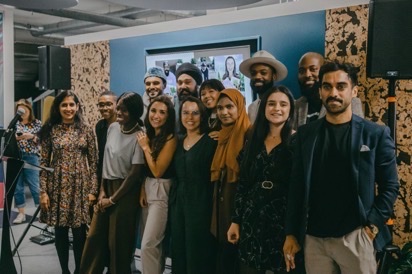It was a sunny day in June when I first heard about People Like Us. I was at a trendy matcha bar in Spitafields meeting with my friends Kevani Aboagye from Word on The Curb and Abbey Wong, one of the other directors from Voice ESEA.
Kevani said “I’m speaking at this thing. It’s called People Like Us. Have you heard of it?”
“No,” we both said.
“It’s a non-profit that has ten people share stories at events,” he said. He whipped out his phone to show us their website, then turned and looked at me. “You should apply. You’d be good for it.”
I was intrigued, I said “yeah cool, I will” and me being the overly proactive person that I am, submitted my application the next day.
I didn’t think anything about it for a few months, but then one day I saw Kevani’s pictures from the event. I’d tried to get tickets but they were sold out, and it made me really want to go to the next one. I figured it must be good if everyone was going.
Spoiler alert- I was wrong. It didn’t end up being good. It ended up being life-changing.
Some more time passed when one day I got an email from Sheeraz Gulsher. I found out I’d been selected as one of the speakers for their next event at Lord’s Cricket Ground with the England x Wales Cricket Board. How did I feel? I apply for a lot of stuff, and I get some of it, but this really felt like a huge opportunity. I was excited and surprised, but mostly I was just really really happy. I imagine it was easier to see my smile from Outer Space than it was to see the Great Wall of China that day.
To kick off, Sheeraz set up a meeting with everyone. I missed the first one because I had a last-minute work emergency. Do you know what Sheerazdid? He called me personally to check in and gave me the benefit of the doubt- without ever having met me. He took the time to get to know me and my interests and set me up with a mentor he thought I would get along with.
Who was that mentor? Danielle Restivo, The Head of Internal Communications at Google Cloud for all of EMEA (Europe, The Middle East, and Africa) and a kick-ass certified Life Coach.

From the first five minutes of meeting Danielle, I knew we’d get along. We both loved poetry and Star Wars, and something about our energies just matched. In the months leading up to the event, she helped me shape my story and encouraged me to read my poetry to a crowd for the first time (which you can read here).
She was kind while being constructive, and she was creative without being distracting. She set an example for me on how to lead and mentor other people in a way that makes them feel good.
The actual night of the event was amazing. Daman Bamrah, who is a hilarious and engaging stand-up comic was the host, and set the night off right. Fueled by the free wine and appetizers, I sat in awe for the next hour, as I learned about everything from what it’s like to be a Young Imam from Sabah Ahmedi, how the former Head of Marketing at F1, Tanya Wilkinson, found purpose through life coaching, to how Prof. Nate Holder started writing children’s books about the power of music, using diverse characters.

I left inspired. I still talk to all of the speakers in a group chat and I met up the next week with Hannah Kalyan, another speaker and PR genius, at a comedy event she was told about by Daman. While we were there, I met two other people, an actor and a guy in marketing who was quitting his job to be a pro surfer in Sri Lanka. The second guy ended up asking me on a date. It’s crazy how a moment of connection created a ripple effect throughout my entire life.
For the past few weeks, I’ve been exploring the power of persuasion in statistics vs. storytelling. What a story does quickly that a statistic never could is to evoke an emotional response.
I spoke to behavioural psychology expert and CEO of Emotional AI, Ian Forrester, who explained to me that emotions are a driver of shareability. To change behaviour, you need to catch the attention of your audience (which is where a bold statistic can help), but if you want someone to remember you and then act on something, you need to evoke emotions, which is where storytelling becomes fundamental.
The power of People Like Us comes from this ability to take audiences through ten journeys a quarter. The secret is the storytelling, but the outcome is a community of people connected long beyond a quarterly event. I have a feeling there will be a lot more stories of opportunities to come from the chance to share our stories, and from an insider’s perspective, I think this was Sheeraz’s and Darain’s plan all along.
I hope this story about my experience at People Like Us showed you the power of a strong narrative tied to emotions and gave you a better understanding of how to connect and persuade other people towards a goal for the common good.

Liked this post? Then make sure to follow me on Linkedin so you’re notified at 9:00am every Wednesday about secrets you don’t know. Next week I’ll explore the psychology of place (virtual and physical) when persuading an audience.
Interested in applying for People Like Us? You’re in luck, they’ve got another event coming up 7th December and you can apply by clicking here.










Comments